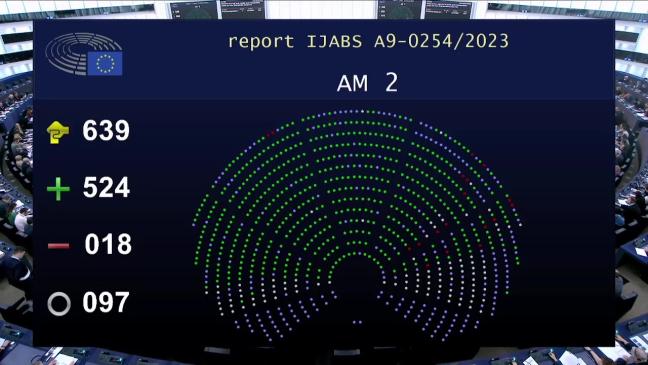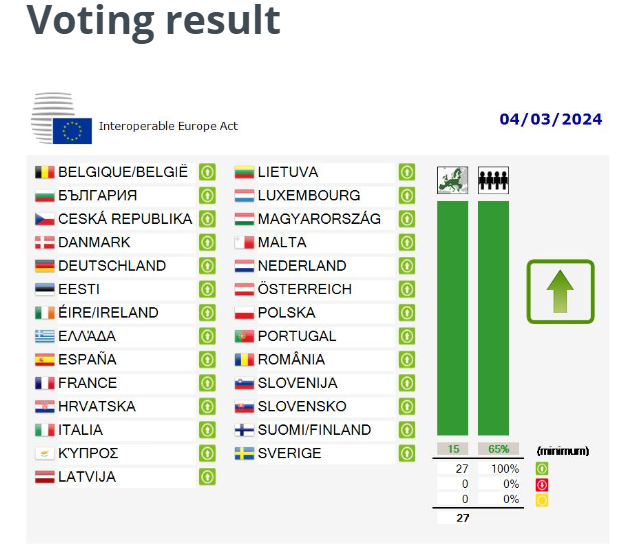The plenary assembly of the European Parliament had its first reading on the Interoperable Europe Act proposal on Monday the 5th and Tuesday the 6th of February. With a very large majority, Parliament overwhelmingly approved the Act. One month later, all 27 EU Member States adopted the deal unanimously in the EU Council.
Of the 639 Members of the European Parliament who attended the vote on the Interoperable Europe Act on Tuesday 5 February, 524 MEPs supported the Act, with only 18 voting against it.

This outcome was preceded by an agreement on the Act reached in trilogue negotiations between the Council and Parliament in November 2023. With both bodies poised to formally approve their consensus independently, it is expected that the Interoperable Europe Act is to become European law after only a first reading. During the debate about the Act on Monday evening, Parliament’s designated rapporteur on the Act Ivars Ijabs (Renew Europe, Latvia) expressed his feeling that a legislative text like the Interoperable Europe Act should have already existed in the EU for a very long time.
‘Citizens deserve to have public services quickly and be able to get them across borders’, Ijabs declared. ‘Unfortunately, data exchange between Member States is often just something that exists on paper. It makes it very difficult to provide public services and it is putting the brakes on economic development. Indeed, in some Member States, interoperability is not even guaranteed domestically. So, we need this legislative text.’ Ijabs also stated that better interoperability could accelerate public services by up to 25%: ‘We need to make sure that future digital services are more effective and that they work in the interests of citizens and businesses. This goes for road safety, health, public procurement, to name but a few.’
European Commission: A promise of cohesive implementation

© European Union 2024 - Source : EP
At the same debate on Monday, European Commissioner Mairead McGuinness (Financial Stability, Financial Services and the Capital Markets Union) declared that ‘the significance of this Act cannot be understated. It lays the groundwork for a future in which digital services are not hindered by geographic or bureaucratic boundaries. And this will make a real difference to European citizens. The Commission will make sure that this initiative is implemented cohesively across every level of government. At the European, national, regional and local level.’
McGuiness also concluded her speech by stating that ‘this act is a vital step towards a more integrated and innovative European digital landscape. It will help shape a responsive and forward local public sector.’
Widespread approval across the main fractions
According to Romanian MEP Gheorghe Falca (European People’s Party), the Act ‘is an important step towards creating a digital European area and consolidating European leadership in this field. We need modern efficient administrations that work with a minimal cost and now we have a chance to attain this objective.”
Portuguese MEP Francisco Guerreiro (Greens/EFA) held the opinion that the Interoperable Europe Act is a very important topic that deals with improving the daily lives of EU citizens. ‘It is one of those debates that shouldn’t be used only in soundbytes on social media.’ Guerreiro’s Catalan colleague Jordi Solé added that the Act will ‘establish a robust foundation for the use and sharing of interoperability solutions, including those based on open source.’ According to Solé, the Act also ‘fosters trust and cooperation between public administrations across the EU, as citizens called for in the Conference on the Future of Europe.’

Maltese MEP Josianne Cutajar (S&D) was positive as well. According to her, one of the main benefits of Interoperability is ‘the enhancement of efficiency and productivity, which translates into cost-savings and more strategical allocation of resources’ and the larger potential of ‘citizens and SME’s to better depend on online public services throughout the EU’. While Cutajar emphasized the necessity to make key public services online for all citizens by 2030, she also stated that she is particularly proud that the Act mentions the importance of maintaining offline accessibility of public services in the interest of the less digitally skilled and the need to take special attention to the resources of disadvantaged regions.
Her Portuguese colleague Maria Manuel Leitão Marques declared that the use of interoperability will allow the sharing of data in a safe way for public and private companies. For this reason, Marques strongly believes The Act will reduce administrative burdens to these companies.
You can watch the recording from the actual parliamentary vote on our Youtube channel.

Unanimous support from 27 Member States
Also the Council showed its broad support for the Act, with all 27 EU Member States giving their green light on the proposed Interoperable Europe Act on 4 March in the Ministerial Council on Transport, Telecommunications and Energy. The recording from the Council vote (under the Belgian presidency) can equally be viewed on our Youtube channel.

Both institutions have now given their approval for the Interoperable Europe Act to be published in the Official Journal of the European Union. Subsequently, 20 days will pass before the Interoperable Europe Act enters into force, and the official phase of the implementation the Act has arrived for the European Commission and the EU Member States.
This article was updated on 8 March 2024, on the occasion of the news of the Council Vote.

